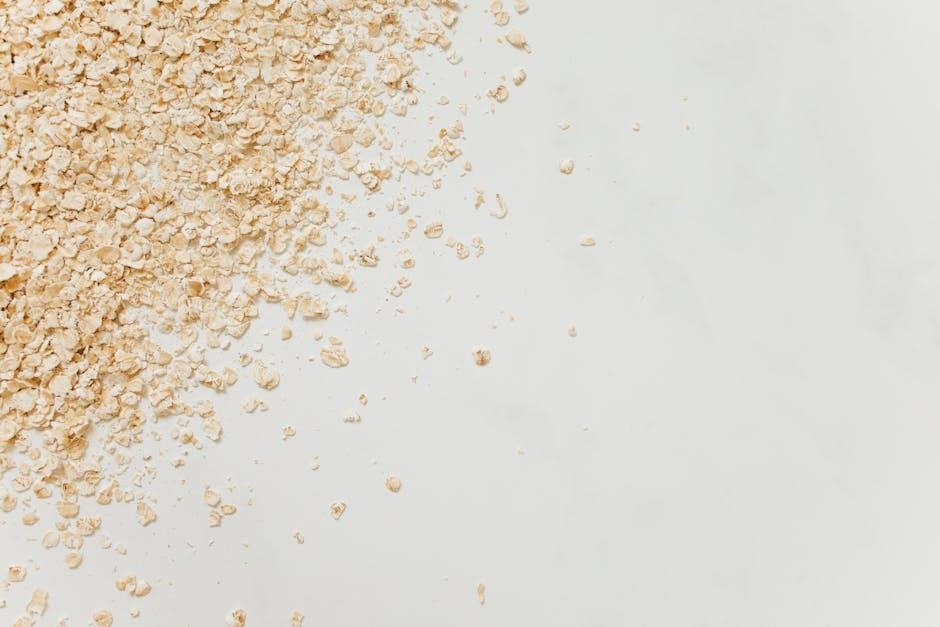pcos diet plan pdf free

Polycystic Ovary Syndrome (PCOS) is a hormonal disorder affecting millions of women. Diet plays a crucial role in managing PCOS symptoms, including weight management, hormonal balance, and inflammation reduction.
1.1 What is Polycystic Ovary Syndrome (PCOS)?
Polycystic Ovary Syndrome (PCOS) is a hormonal disorder affecting millions of women, often causing ovarian cysts, irregular periods, and hormonal imbalance. It leads to symptoms like acne, excess hair growth, and weight gain. Insulin resistance and inflammation are common, impacting fertility and overall health. While the exact cause is unknown, genetics and environmental factors are believed to contribute.
1.2 The Role of Diet in Managing PCOS
Diet plays a pivotal role in managing PCOS symptoms by balancing hormones, improving insulin sensitivity, and reducing inflammation. A well-structured diet helps regulate menstrual cycles, promotes weight management, and enhances fertility. By focusing on anti-inflammatory and low-glycemic foods, women with PCOS can alleviate symptoms and improve overall health, making diet a cornerstone of PCOS management.

The Impact of Diet on PCOS Symptoms
Diet significantly impacts PCOS symptoms by regulating hormonal balance, improving insulin sensitivity, and reducing inflammation. A balanced diet can lead to weight loss and improved metabolic health, supporting long-term well-being.
2.1 How Diet Affects Hormonal Balance and Metabolism
A balanced diet helps regulate hormones like insulin and androgens, which are often imbalanced in PCOS. Low-glycemic foods stabilize blood sugar, reducing insulin resistance and inflammation. Anti-inflammatory foods, such as berries and leafy greens, further support hormonal balance. A tailored diet plan can address metabolic challenges, promoting weight loss and improving overall hormonal health for women with PCOS.
2.2 The Link Between Diet and Fertility in PCOS
Diet plays a crucial role in improving fertility for women with PCOS by regulating hormonal imbalances and insulin sensitivity. A low-glycemic, anti-inflammatory diet helps stabilize blood sugar and promote ovulation. Foods rich in antioxidants and omega-3 fatty acids, such as fish and berries, support reproductive health. Managing weight through a balanced diet can also enhance fertility outcomes, making it easier to conceive.
Best Diet for PCOS
A balanced, anti-inflammatory diet with low-glycemic foods is ideal for PCOS. Focus on whole grains, lean proteins, and healthy fats to stabilize blood sugar and hormones.
3.1 Anti-Inflammatory and Balanced Diet
An anti-inflammatory, balanced diet is essential for managing PCOS. Focus on whole, unprocessed foods like vegetables, fruits, lean proteins, and whole grains. Include healthy fats from sources like avocados, nuts, and olive oil. Avoid refined carbohydrates and sugary foods to reduce inflammation and insulin resistance, which are common in PCOS. This approach supports hormonal balance and overall well-being.
3.2 Importance of a Low-Glycemic Index (GI) Diet
A low-Glycemic Index (GI) diet is vital for managing PCOS symptoms. It helps stabilize blood sugar levels, reducing insulin resistance and inflammation. By choosing foods with low GI, such as whole grains, vegetables, and lean proteins, women with PCOS can regulate hormonal imbalances and support weight management, which are critical for improving fertility and overall health.
PCOS Diet Plan for Weight Loss
A tailored PCOS diet plan promotes weight loss by focusing on portion control, balanced macronutrients, and physical activity, helping improve insulin sensitivity and metabolic health effectively.
4.1 Benefits of Weight Loss for PCOS Symptoms
Weight loss significantly improves PCOS symptoms by enhancing insulin sensitivity, reducing inflammation, and balancing hormones. It can restore menstrual cycles, boost fertility, and decrease the risk of related health issues like diabetes and heart disease. Even a modest weight reduction can lead to noticeable improvements in hormonal balance, acne, and excess hair growth, improving overall well-being.
4.2 Tips for Creating a PCOS-Friendly Weight Loss Diet Plan
- Focus on portion control to avoid overeating and promote gradual weight loss.
- Incorporate balanced macronutrients, including lean proteins, healthy fats, and complex carbs, at each meal.
- Choose low-glycemic index foods to stabilize blood sugar levels and reduce cravings.
- Stay hydrated and limit sugary drinks to support metabolism and overall health.
- Eat regular, smaller meals throughout the day to maintain energy levels and prevent binge eating.
- Eliminate processed foods and opt for whole, nutrient-dense options to minimize inflammation.
- Track your progress and adjust your plan as needed to ensure long-term success.

Exercise and Lifestyle Changes
Regular physical activity improves hormonal balance, metabolism, and overall well-being in PCOS. A combination of cardio, strength training, and mindfulness practices supports long-term symptom management effectively.
5.1 How Exercise Supports PCOS Management
Regular physical activity improves hormonal balance, insulin sensitivity, and metabolic health in women with PCOS. Exercise helps reduce weight, lower androgen levels, and enhance fertility. Incorporating a mix of cardio, strength training, and flexibility exercises can alleviate symptoms and improve overall well-being, making it a cornerstone of PCOS management strategies.
5.2 Customizing Your Exercise Routine for PCOS
A personalized approach to exercise is essential for managing PCOS effectively. Consulting a healthcare provider helps tailor routines to individual needs. Balancing cardio, strength training, and flexibility exercises supports weight loss and hormonal balance. Incorporating activities you enjoy ensures long-term adherence, making exercise a sustainable part of your PCOS management plan for improved health outcomes.

Sample 7-Day PCOS Meal Plan
A 7-day PCOS meal plan offers delicious, balanced options, focusing on whole foods and anti-inflammatory ingredients. It includes meal ideas, snacks, and superfoods to support symptom relief and weight management, available as a free PDF guide for easy reference.
6.1 Delicious and Nutritious Meal Ideas for PCOS
Focus on whole, nutrient-dense foods like leafy greens, berries, and lean proteins to create tasty and balanced meals. Incorporate anti-inflammatory ingredients such as turmeric, cinnamon, and omega-3 rich foods. Meal ideas include overnight oats, grilled chicken salads, and quinoa bowls. These recipes support hormonal balance and weight management while keeping meals flavorful and satisfying.
6.2 Incorporating Superfoods for PCOS Symptom Relief
Incorporate superfoods like spinach, kale, berries, and omega-3 rich foods to reduce inflammation and regulate hormones. Berries are packed with antioxidants that combat oxidative stress, while leafy greens support detoxification. Fatty fish like salmon aid in hormone balance. These nutrient-dense foods can be seamlessly integrated into meals to enhance symptom relief and overall well-being for women with PCOS.

Managing PCOS Symptoms Through Nutrition
Nutrition is vital for managing PCOS symptoms, addressing hormonal imbalances, and reducing inflammation. Tailoring dietary choices helps alleviate specific symptoms and improve overall well-being effectively.
7.1 Foods to Eat and Avoid for PCOS
For PCOS management, focus on anti-inflammatory foods like whole grains, lean proteins, and healthy fats. Avoid high-sugar, processed foods, and refined carbohydrates. Incorporate omega-3 rich foods, berries, and leafy greens to reduce inflammation. Limit dairy and opt for low-GI options to stabilize blood sugar. A PCOS diet plan PDF free guide often includes detailed food lists to help tailor your nutrition effectively.
7.2 The Role of Supplements in PCOS Management
Supplements like inositol, berberine, and omega-3 fatty acids can support PCOS management by improving insulin sensitivity, balancing hormones, and reducing inflammation. A PCOS diet plan PDF free often highlights these options. Always consult a healthcare provider to determine the best supplements for your specific needs, as they can complement dietary changes and enhance overall well-being for women with PCOS.

Free PCOS Diet Plan Resources
Free PCOS diet plans are available online, offering meal guides and PCOS diet plan PDF free resources. These tools provide structured approaches to managing symptoms through nutrition and lifestyle adjustments effectively.
8.1 Where to Find Free PCOS Diet Plan PDFs
Free PCOS diet plan PDFs are widely available online, offering comprehensive guides and meal plans. Websites like health blogs, nutrition platforms, and PCOS support communities provide downloadable resources. Many dietitians and health organizations share free PCOS diet plan PDFs with detailed meal ideas, shopping lists, and tips for symptom management. These resources are easily accessible and designed to help women implement a PCOS-friendly diet effectively.
8.2 Utilizing Online Communities and Expert Guidance
Online communities and expert guidance are invaluable for managing PCOS. Websites, forums, and social media groups offer support and resources. Dietitians and health experts often share free PCOS diet plan PDFs and host webinars. These platforms provide personalized advice, meal ideas, and motivation, helping women create tailored plans and maintain consistency in their PCOS journey.

Lifestyle Changes for Long-Term PCOS Management
Lifestyle changes, including diet, exercise, and stress management, are essential for long-term PCOS management. Consistency and holistic approaches improve symptoms and overall well-being.
9.1 The Importance of Consistency in Diet and Exercise
Consistency in diet and exercise is vital for managing PCOS long-term. Regular healthy eating and physical activity help stabilize hormones, improve metabolism, and reduce inflammation. Over time, these habits promote weight management, enhance fertility, and boost overall well-being, making them cornerstone practices for sustainable PCOS care.
9.2 Mind-Body Practices for PCOS Wellness
Mind-body practices like yoga, meditation, and deep breathing can significantly improve PCOS management by reducing stress and promoting hormonal balance. These techniques enhance emotional well-being and complement dietary and exercise routines, fostering a holistic approach to managing symptoms and improving quality of life for women with PCOS.
A well-structured PCOS diet plan, combined with lifestyle changes, significantly improves symptoms and overall health. Free PDF resources provide guidance, helping women manage PCOS effectively and confidently.
Consistency and professional consultation are key to long-term success, ensuring a balanced and sustainable approach to managing PCOS through nutrition and holistic wellness practices.
10.1 Summary of Key Points
A PCOS diet plan focuses on balanced nutrition, weight management, and hormonal balance. Free PDF resources offer structured meal ideas, food lists, and lifestyle tips, aiding symptom relief and fertility improvement. Consistency in diet and exercise, along with professional guidance, is essential for long-term success. These resources empower women to make informed choices, promoting overall wellness and confidence in managing PCOS effectively.
10.2 Final Thoughts on Implementing a PCOS Diet Plan
Implementing a PCOS diet plan is essential for managing symptoms and improving fertility. Free PCOS diet plan PDFs offer structured meal ideas and expert guidance, aiding in symptom relief and hormonal balance. Consistency and professional advice are key for long-term success. Incorporating lifestyle changes and leveraging online communities can further enhance your journey, empowering you to take control of your PCOS wellness effectively.